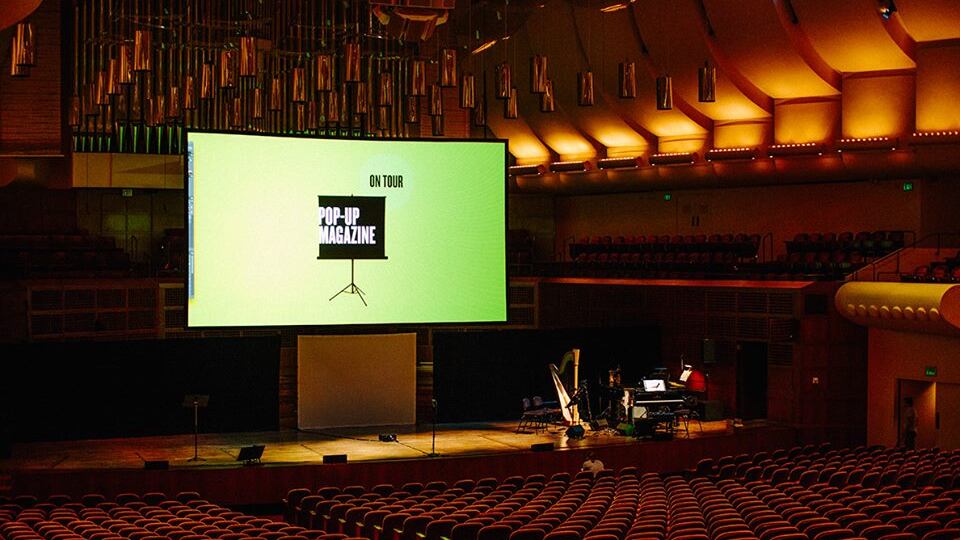In the age of the listicle, Pop-Up Magazine's form of journalism seems pretty epic. The touring show creates an ephemeral, live magazine: a group of journalists, musicians, filmmakers and deliver their article on stage through a multimedia performance.
Founded in 2009, the show regularly sells out theaters and books a diverse group of contributors who are well established in their field (the lineup for the magazine's current tour includes writers for The Atlantic, The New York Times, NPR and ESPN).
Given the popularity of live podcast tapings and storytelling nights, Pop-Up Magazine's popularity isn't too surprising. But unlike other formats, it has a specific goal of getting its audience to interact differently with the information they consume. In that way, the show sort of has one foot in the past and another in the future: It's an inventive format that's skeptical of the way we've come to interact with information. Before the magazine materializes in Portland tonight, WW talked to Pop-Up Magazine co-founder Chas Edwards about the ideas behind the show and what's in store for tonight's performance.
WW: What distinguishes the show from a nonfiction storytelling night or a live podcast?
Chas Edwards: Radio producers, documentary filmmakers, writers and photographers perform true multimedia stories made especially for the stage. We're inspired by magazines, so the stories are dispatches, profiles, arguments, and more, and they're mostly reported. The night ends gathered around the bar, with the performers and audience mingling together.
How do most journalists seem to feel about being asked to perform their stories? I can imagine it could be intimidating.
You know, our cast inevitably loves the experience. We work with them until they feel really good about their stories. And our audiences have been incredibly enthusiastic. Plus, for the writers, radio producers, documentary filmmakers and photographers who perform with us, it's a chance to meet old fans and new ones at the after-party following each show.
Have you ever encountered journalism purest who take issue with the idea of performance journalism?
The show is really clearly a lover letter to reported stories in all the forms they can take. When journalists come to the show, they get the spirit of what we're doing right away, and they often can't help but think about what they'd do up there onstage. And we meet great future contributors this way.
Can you explain the importance of why the show is never recorded or streamed?
The show is designed for the people in the theater, that night. When you know the show will disappear after you see it, you pay attention in a different way. And you remember in a different way. The night feels special. And since you have to be there, or you missed it, this encourages everyone to come out and experience something together. And talk about it and meet the people who made the stories over drinks.
It seems kind of counterintuitive to be like, "okay, people aren't really devoting time and attention to stories and journalism. Let's ask them to leave their homes and go to a theater to interact with it.' But clearly, it works. Any theories as to why?
It's partly about time of day. At work, when we scan headlines all day long, we don't have time to lose ourselves in a story. Pop-Up Magazine is always at night. People who buy tickets and bring a few friends to a Pop-Up Magazine show are inviting us into their leisure time. Leisure time is precious, it's hard to convince people to let you into it, but when they do, you get their undivided attention, and it allows you to tell a different kind of story.
Any clues as to what will happen at the Portland show?
I don't want to spoil any surprises, but we will visit a town in Alaska that has an unusual animal problem, go inside a blind date that's lasted for 30 years, and ride along with a unique detective agency.
Pop Up Magazine is at Revolution Hall, 1300 SE Stark St #110, on Tuesday, March 7. Sold out.

